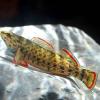Rio grande "texas" cichlid breeding/rearing help
#1
 Guest_John4ds_*
Guest_John4ds_*
Posted 19 September 2014 - 01:09 PM
Is there a way I can remove the eggs safely and place them in a separate aquarium? How will I go about setting something like that up? And how about aeration of the eggs?
#2

Posted 19 September 2014 - 01:14 PM
(Moderator edit: the Rio Grande Cichlids are in fact North American Native Fish and are discussed here. Don't go somewhere else, used the search function here.)
#3
 Guest_John4ds_*
Guest_John4ds_*
Posted 19 September 2014 - 01:41 PM
I'll check out the site, thanks!
#4
 Guest_Dustin_*
Guest_Dustin_*
Posted 19 September 2014 - 03:15 PM
The Texas cichlid is native and is certainly pertinent discussion material. Unfortunately, I can't help with the original question though. Hopefully someone will chime in shortly.
#5
 Guest_don212_*
Guest_don212_*
Posted 19 September 2014 - 04:26 PM
#6
 Guest_John4ds_*
Guest_John4ds_*
Posted 19 September 2014 - 10:23 PM
I've breed tilapia before using an egg tumbler.
Just not so sure on the initial setup :/
#7

Posted 20 September 2014 - 06:58 AM
And guys, I didn't say they weren't native, I said they weren't as popular in native keepers as in tropical keepers, and dustin, same as above dude, stop bashing.
P.S. if y'all keep doing the whole no one can leave links to other forums thing, your going to lose a member.
#8
 Guest_Skipjack_*
Guest_Skipjack_*
Posted 20 September 2014 - 12:55 PM
You clearly stated that they aren't native. It is okay to be wrong. I see absolutely no "bashing" going on here whatsoever.Since they aren't native I would join here www.aquaticentusiast.com and/or www.aquaticenthusiast.com they are both really good sites, I'm on both too.
Our rules are in place for a reason, and that reason is not to simply irritate you or any other member. The forum staff and moderators adhere to our rules and ensure that they are followed. We occasionally lose a member because they do not like our rules, but we are not going to alter something that works for an occasional complaint. In this case I suppose we are at risk of losing a member, because we simply do not allow links to other forums, or any links in signatures unless approved and very related. I hope you stick around and learn from other folks though instead of leaving over something so small as posting links.
#9

Posted 20 September 2014 - 05:03 PM
#10
 Guest_mikez_*
Guest_mikez_*
Posted 22 September 2014 - 08:18 AM
Many will tell you all kinds of ways to hatch eggs but after a bit of time and a number of tropical and native breeding successes, I came to the conclusion nature does it best.
#11
 Guest_don212_*
Guest_don212_*
Posted 22 September 2014 - 11:43 AM
#12
 Guest_John4ds_*
Guest_John4ds_*
Posted 22 September 2014 - 09:43 PM
If I see eggs before hand, I'll try that air stone method👍
Would an egg tumbler work?
Mouth breeders are simple to breed, I have bred tilapia before. Either carefully remove the female once her mouth is full or strip her and place the fish eggs or underdeveloped fry into an egg tumbler.
#13

Posted 23 September 2014 - 12:20 PM
Not sure what all the confusion about whether or not Herichthys cyanoguttatus is a native or not is all about. They are. And whether or not they are tropical is a moot point. It is a native species found within the boarders of the U.S., it is a valid species to discuss on this forum. I agree with the ruling not to allow links to other forums. A simple google search is all you'd need to find other forums--much the same as a lot of people found the NANFA forum.
#14

Posted 23 September 2014 - 03:15 PM
I did not look at or join the aforementioned forums. I joined NANFA to discuss native fish species and will join other forums if I am interested in discussing any other group of fish or animals. I can appreciate your willingness to openly express your distaste for the way NANFA chooses to conduct itself. However, I'm sure you'll find that the moderators will happily speak with you privately--as opposed to speaking out on an otherwise legitimate and interesting topic regarding native cichlid breeding.
#15
 Guest_don212_*
Guest_don212_*
Posted 23 September 2014 - 04:47 PM
#16

Posted 23 September 2014 - 05:17 PM
#17
 Guest_don212_*
Guest_don212_*
Posted 23 September 2014 - 08:12 PM
#18
 Guest_gzeiger_*
Guest_gzeiger_*
Posted 24 September 2014 - 02:51 PM
#19
 Guest_John4ds_*
Guest_John4ds_*
Posted 27 September 2014 - 07:20 PM
Should I remove the fry?
#20

Posted 27 September 2014 - 08:39 PM
0 user(s) are reading this topic
0 members, 0 guests, 0 anonymous users








